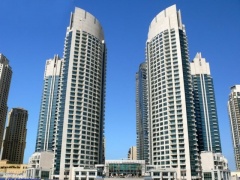28.09.2014

The emirate remains one of the most affordable metropolitan cities in the world despite the fact that rents skyrocketed over the past year. After ten quarters of constant positive growth, residential rents suffered a marginal dip during the third quarter this year, falling by around 1%. While this may not seem significant on its own, it has become apparent that there are changes taking place in the rental market with buyers becoming increasingly more price-aware.
The slow down in growth has been attributed to an increase in residential stock, something that is set to continue increasing as the emirate gears up for Expo 2020. In fact, around 19,000 new homes are scheduled to enter the market next year. Mid-tier developers are working on completing multiple projects simultaneously in locations such as Sports City and which could add to the residential stock in bulk by 2017 and thereafter. Newer clusters are also getting created, such as Silicon Park in Silicon Oasis.
Research shows that locations such as the International Media Production Zone, TECOM and Downtown Dubai may have seen a 3% trim in rental demands. Other clusters such as Jumeirah Lakes Towers and Dubailand Residences recorded dips of around 2%.
Mat Green, head of research and consultancy, CBRE Middle East, says: "The slowdown reflects a general movement towards stabilisation in the market, along with the slowing of growth in sales values and lower transaction volumes. We expect this trend to continue into the final quarter."
With the market moving towards increased stability, it has begun to attract even more investor attention. The emirate remains one of the most affordable metropolitan cities in the world despite the fact that rents skyrocketed over the past year. Paul Preston, head of IP Global, Middle East, noted: "More and more people are starting to see property investment as one of the highest performing asset classes within their investment portfolios."
The slow down in growth has been attributed to an increase in residential stock, something that is set to continue increasing as the emirate gears up for Expo 2020. In fact, around 19,000 new homes are scheduled to enter the market next year. Mid-tier developers are working on completing multiple projects simultaneously in locations such as Sports City and which could add to the residential stock in bulk by 2017 and thereafter. Newer clusters are also getting created, such as Silicon Park in Silicon Oasis.
Research shows that locations such as the International Media Production Zone, TECOM and Downtown Dubai may have seen a 3% trim in rental demands. Other clusters such as Jumeirah Lakes Towers and Dubailand Residences recorded dips of around 2%.
Mat Green, head of research and consultancy, CBRE Middle East, says: "The slowdown reflects a general movement towards stabilisation in the market, along with the slowing of growth in sales values and lower transaction volumes. We expect this trend to continue into the final quarter."
With the market moving towards increased stability, it has begun to attract even more investor attention. The emirate remains one of the most affordable metropolitan cities in the world despite the fact that rents skyrocketed over the past year. Paul Preston, head of IP Global, Middle East, noted: "More and more people are starting to see property investment as one of the highest performing asset classes within their investment portfolios."







